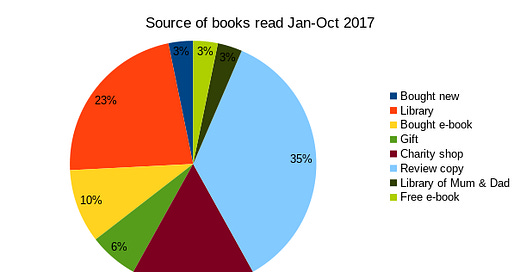Ethically sourced books
I bought my first brand new full price paperback novel in a long time, at the weekend (written by a friend, released by an indie publisher), and it got me thinking about how and where I get my reading material, and whether the author gets anything out of it.
Last week I was discussing e-book pricing with a selection of strangers on Twitter. Sam from Lounge Books pointed out that readers are now used to paying less for e-books than paperbacks:
https://twitter.com/samatlounge/status/926110884526723072
I then commented that you can't get second-hand e-books, so for those of us used to charity shop prices, even a discounted paperback price for an e-book can seem unusually high. Libraries, as usual, are the answer - the author gets a payment, the reader gets it for free (covered by some tax they'd have to pay anyway). But do I practice what I preach?

If in doubt, make a chart. First I looked at books I'd read so far this year, and where I got them from (strictly speaking Library of Mum & Dad this year actually means Big Brother). I'm only looking at books I've read the whole of, so if I gave up on it (like the book I took back to the library on Friday morning after 3 chapters), or read only part of a collection or reference book, it's not counted. Neither do I count audio books.
What we can see from this is that more than half the books I've read so far this year haven't directly contributed to the author's earnings. I say directly because you could (if you were grasping at straws) argue that all those review copies generate a review that drums up sales or library borrowing. So am I always this bad?

Er, pretty much, yes. I bought a few e-books in 2016/17 because I got a Kobo voucher for Christmas 2015 (so should they all be under gifts?) and I watched for special offers and made that voucher stretch as far as I could. Even the gifts aren't always bought new, as we often give each other second-hand books in my family (including friend T), though I have bought a few new books to give to other people over this time period. Free e-books are mainly the out of copyright variety though one or two were special offers (and one was a digital textbook that came with an online university course).
In my defence, when I buy second-hand books it's almost always from a charity shop, so at least some charity benefits rather than a private vendor. And if there's a copy of a book I want to read available in the Library of Mum & Dad, it would seem rude not to borrow it. I'm not about to give up the thrill of getting books through the post, either, often before they're out there in bookshops. Maybe I could wean myself off the discount e-books, however, and borrow more from the library, as I understand authors get more cash that way.
A promise to frequent the local library more? That shouldn't be hard to keep. Who's with me? Last one to the issue desk buys the tea and biscuits...



